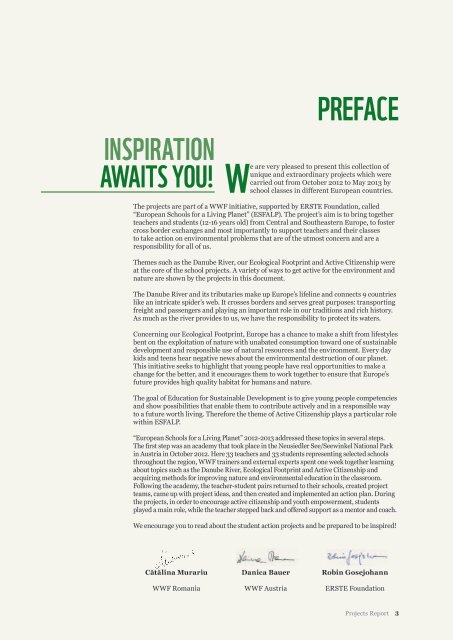esfalp_v_-_web_small.pdf - European schools for a living planet
esfalp_v_-_web_small.pdf - European schools for a living planet
esfalp_v_-_web_small.pdf - European schools for a living planet
- No tags were found...
You also want an ePaper? Increase the reach of your titles
YUMPU automatically turns print PDFs into web optimized ePapers that Google loves.
PREFACEINSPIRATIONAWAITS YOU!We are very pleased to present this collection ofunique and extraordinary projects which werecarried out from October 2012 to May 2013 byschool classes in different <strong>European</strong> countries.The projects are part of a WWF initiative, supported by ERSTE Foundation, called“<strong>European</strong> Schools <strong>for</strong> a Living Planet” (ESFALP). The project’s aim is to bring togetherteachers and students (12-16 years old) from Central and Southeastern Europe, to fostercross border exchanges and most importantly to support teachers and their classesto take action on environmental problems that are of the utmost concern and are aresponsibility <strong>for</strong> all of us.Themes such as the Danube River, our Ecological Footprint and Active Citizenship wereat the core of the school projects. A variety of ways to get active <strong>for</strong> the environment andnature are shown by the projects in this document.The Danube River and its tributaries make up Europe’s lifeline and connects 9 countrieslike an intricate spider’s <strong>web</strong>. It crosses borders and serves great purposes: transportingfreight and passengers and playing an important role in our traditions and rich history.As much as the river provides to us, we have the responsibility to protect its waters.Concerning our Ecological Footprint, Europe has a chance to make a shift from lifestylesbent on the exploitation of nature with unabated consumption toward one of sustainabledevelopment and responsible use of natural resources and the environment. Every daykids and teens hear negative news about the environmental destruction of our <strong>planet</strong>.This initiative seeks to highlight that young people have real opportunities to make achange <strong>for</strong> the better, and it encourages them to work together to ensure that Europe’sfuture provides high quality habitat <strong>for</strong> humans and nature.The goal of Education <strong>for</strong> Sustainable Development is to give young people competenciesand show possibilities that enable them to contribute actively and in a responsible wayto a future worth <strong>living</strong>. There<strong>for</strong>e the theme of Active Citizenship plays a particular rolewithin ESFALP.“<strong>European</strong> Schools <strong>for</strong> a Living Planet” 2012-2013 addressed these topics in several steps.The first step was an academy that took place in the Neusiedler See/Seewinkel National Parkin Austria in October 2012. Here 33 teachers and 33 students representing selected <strong>schools</strong>throughout the region, WWF trainers and external experts spent one week together learningabout topics such as the Danube River, Ecological Footprint and Active Citizenship andacquiring methods <strong>for</strong> improving nature and environmental education in the classroom.Following the academy, the teacher-student pairs returned to their <strong>schools</strong>, created projectteams, came up with project ideas, and then created and implemented an action plan. Duringthe projects, in order to encourage active citizenship and youth empowerment, studentsplayed a main role, while the teacher stepped back and offered support as a mentor and coach.We encourage you to read about the student action projects and be prepared to be inspired!Cătălina Murariu Danica Bauer Robin GosejohannWWF Romania WWF Austria ERSTE FoundationProjects Report 3



